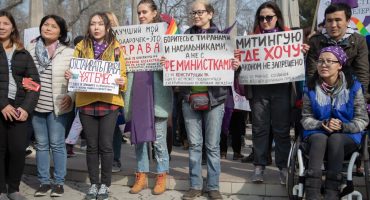Any type. A journalist can look at all news – international or local, including politics, sports, business, education, crime, art and entertainment, science, health, lifestyle, fashion, travelling – through the prism of religion.
Investigative reports, stories where main characters are representatives of any religion, profiles of famous persons and common people focusing on their religious peculiarities, as well as analytics containing faith issues can be regarded as religious.
It is dangerous for the secular media to trust such sources and to distribute only this opinion. It’s better not to use theological terms and citations from religious sources without the need and accurate explanation in materials. Religious writings can be interpreted in different ways.
When preparing materials dedicated to religion, it is important to keep the balance of opinions, just like for messages dedicated to other topics. Look for different sources, including the ones that demonstrate the modern view on the issue and do not offer old methods of its solution.
First, they should keep to international journalistic standards when preparing materials dedicated to religious topics: impartiality, accuracy, honesty, integrity, as well as the principle of protection of sources.
Besides, they should keep in mind that:
- They need to respect the role of faith in people’s life;
- They should be prepared to study religious topics;
- They should understand that there may be more than two parties to every religious story;
- They should not promote any religious view;
- They should be prepared to spend time with their main characters regardless of where and how they live, gather and pray;
- They should be able to describe the details of various religious beliefs clearly and objectively, even if they do not agree with them;
- They should keep in mind that the majority of religious issues are related to the sacred writings;
- They should work via culture, have strong writing skills to be able to describe various rites and their peculiarities to the audience.
Before writing the article about religious minorities, try to learn more about the group and to spend at least one day with the representatives of this community by studying their practices, watching how they contact with people. There is no need to take side with their religion, but this experience will let you know these people better.
Try to figure out what has caused stereotypes about a given religious community and why? Which external factors in your country (law, freedom of expression and belief, level of critical thinking of the audience) have impact on the perception of a given religious minority? Ask experts and scholars about it.
Do not set the religious minority against the society: there are possibly people in the community who are good specialists and contribute to the national development.
Do not focus on the immediate event or a conflict that takes place with participation of the religious minority and its consequences. Look into the roots of the problem that often have nothing to do with their religious affiliation.
Put facts into your context, and describe a possible solution to a problem in analytical materials and journalistic investigations (if relevant), via interviews with experts. However, do not incite debates about this decision in your report until your audience is prepared to accept the religious diversity.
There is a legal procedure of registration of religious organisations in Central Asian states. You can find information about a community and its status on the following resources:
Tajikistan
Kyrgyzstan
State Committee for Religious Affairs of the Kyrgyz Republic
Uzbekistan
Ministry of Justice of the Republic of Uzbekistan
Committee for Religious Affairs of the Republic of Uzbekistan
General Prosecutor’s Office of the Republic of Uzbekistan
Kazakhstan
Committee for Religious Affairs of the Ministry of Culture and Sport of the Republic of Kazakhstan
Legal Statistics and Special Records Committee of the Republic of Kazakhstan
You must mention the legal status of a religious organisation you are writing about in your material.
Yes. The constitutions of Central Asian states grant the right to freedom of religion to all citizens. Therefore, a journalist may practise their own religion without violating ethical principles. Their knowledge may possibly improve their future report.
To do this, a journalist should keep to a few simple rules:
- Do not make reports and news coverage directly from the mosque, church, prayer hall or a place that you attend;
- Do not promote your faith or religious traditions in your materials more than religions you are writing about;
- Do not often refer to the believers in your religious community;
- Do not report problems of your religious community and do not promote your community on the news;
- Do not write about secular issues that contradict your own religious opinions.
In addition, you should refuse any leader position in your religious community because it can threaten your journalistic ability to report religious traditions objectively and impartially.
- Decide within your editorial office how you will call people who commit such crimes. According to the international journalistic standards, we may not call the participants of the crime “terrorists” before court decision qualifying them as such. For the same reason, a professional journalist may not call them ‘Muslim extremists’ in their report, especially as there is no such definition at all. Thus, a journalist mixes religion and crime.
- Make up a glossary of terms used in religious topics.
- If these people are recognised as terrorists by court, you should indicate it in your material by citing the excerpts of court judgement.
- Always reveal the non-religious reason for the event, yet keep neutral. The journalist must provide only substantiated facts, not estimating them.
- Dispel the myths of banned groups by context and investigation, for example, specifying that the so-called ‘dirty bombs’ or access of terrorists to nuclear weapons is the phantom of their imagination. The same refers to the bogus ‘jihad’, which they perform for the sake of religion. Or the myth that radical extremist groups concentrate in Central Asia to perform jihad. Carry out journalistic investigations, reject the myths of the existing reality, emphasise actual discrepancies, divert the public attention by focusing in on the real aspects of religion.
Hate speech is a major problem of modern media. The media outlets are often involved into various conflicts, media wars, which sometimes instigate the journalists to violate the standards of ethics. As a result, materials where texts may communicate hate and conflicts between various communities rather than tolerance and acceptance of diversity may emerge.
In preparing the article on a religious topic, you must avoid the use of unacceptable terminology.
Arabization of the country, jihad, Islamists, Islamic state, suicide bombers, Shakhids, godless people, bigot – these terms must not be used by journalists. The initial meaning of these words has been distorted and now shapes a negative perception of the Muslim religion.
For the list of terms recommended for use, as well as for the guidelines for the coverage of religious issues see here.
If you have found a spelling error, please, notify us by selecting that text and pressing Ctrl+Enter.





